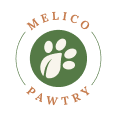
Why Is Your Dog Eating Grass? What It Means and When to Worry
Share
Caught Your Dog Eating Grass? Here’s What It Could Mean. You're not alone if you’ve ever caught your dog munching on grass. Many dog parents wonder whether this behavior is normal or a sign of something more serious. At Melico Pawtry, we believe in empowering dog owners with expert-backed knowledge so they can confidently care for their furry companions. So, what’s the deal with dogs eating grass? Is it just a quirky habit, or should you be concerned?
5 Common Reasons Why Dogs Eat Grass
- Natural Instinct – Dogs are descendants of wild canines that often consumed plants as part of their diet. Eating grass may be an inherited trait that serves a purpose in digestion or nutrient intake.
- Digestive Aid – Some dogs turn to grass to help settle an upset stomach. While it’s a common belief that dogs eat grass to induce vomiting, research suggests that only a small percentage actually throw up afterward.
- Nutritional Deficiency – If your dog’s diet lacks fiber or certain minerals, they might instinctively seek out grass to supplement their intake. Ensuring a well-balanced, high-quality diet—like the natural, eco-conscious treats we offer at Melico Pawtry—can help prevent this.
- Boredom or Anxiety – Some dogs eat grass out of boredom, stress, or even as a coping mechanism. If your pup is left alone for extended periods or lacks mental stimulation, providing engaging activities like chew toys or interactive playtime can help curb the behavior.
- They Simply Like It – Believe it or not, some dogs just enjoy the taste and texture of grass! If they’re not showing any signs of illness and are otherwise healthy, occasional grass-eating may just be a harmless preference.
What Your Dog’s Grass-Eating Habit Says About Their Health
While grass-eating is generally considered safe, it’s essential to monitor for any unusual signs. If your dog eats grass excessively, vomits frequently, has diarrhea, or shows signs of lethargy, there could be an underlying health issue that requires attention.
Additionally, be mindful of where your dog is eating grass. Lawns treated with pesticides or herbicides can pose a serious risk to their health. At Melico Pawtry, we advocate for natural, pet-safe environments to ensure your dog’s well-being.
Should You Stop Your Dog from Eating Grass? Here’s What to Do
In most cases, occasional grass consumption is nothing to worry about. However, here are a few steps you can take to ensure your dog’s safety:
● Provide a Well-Balanced Diet: Ensure your dog gets all the necessary nutrients from high-quality food and treats, such as Melico Pawtry’s eco-friendly chews.
● Engage in Regular Exercise and Mental Stimulation – A well-exercised and mentally stimulated dog is less likely to engage in odd behaviors out of boredom.
● Monitor for Toxic Plants and Treated Grass—If your dog eats grass frequently, ensure it is in a safe, untreated environment.
● Consult Your Veterinarian—If the grass-eating is excessive or accompanied by signs of illness, a vet visit is always a good idea.
Final Thoughts
At Melico Pawtry, we understand that every dog is unique, and their behaviors often have deeper meanings. While grass-eating is typically harmless, staying informed and proactive in your pet’s care ensures their long-term health and happiness. If you’re looking for nutritious, eco-friendly alternatives to satisfy your dog’s instincts, explore our range of all-natural chews and treats designed with their well-being in mind.
